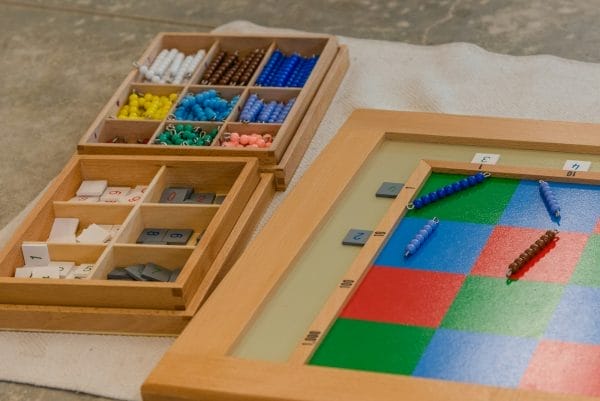A Journey Through Montessori Math: Making Math Fun and Accessible
Mathematics is often seen as a challenging subject for many students, but the Montessori method of education seeks to change this perception by introducing Montessori math—an engaging, hands-on approach to learning that makes understanding numbers and mathematical concepts far more accessible and enjoyable. Developed by Dr. Maria Montessori, this method emphasizes learning through exploration and manipulation of materials, rather than through rote memorization.
Let’s dive into what makes Montessori math unique and explore the materials and activities that facilitate this innovative way of learning.

What is Montessori Math?
![]()
Montessori math is a component of the broader Montessori curriculum, which is grounded in the belief that children learn best through active, self-directed engagement with their environment. In Montessori math, this principle translates to hands-on learning with specialized materials designed to represent abstract mathematical concepts in a concrete way. This approach allows children to understand the ‘why’ behind the numbers, laying a strong foundation for advanced mathematical thinking.
Core Principles of Montessori Math
![]()
The Montessori math curriculum is built on several key principles:
- Concrete to Abstract: Children start with tangible, physical objects to grasp complex ideas before moving on to abstract representations.
- Self-Correction: Materials are designed to allow children to identify and correct their errors independently, promoting self-assessment skills.
- Individual Pacing: Each child progresses through the curriculum at their own pace, ensuring they fully understand each concept before moving on.
- Sequential Learning: Concepts are introduced in a logical sequence, with each new step building on the previous one.
The Montessori Math Materials
![]() v
v
Central to Montessori math is the use of carefully crafted materials that help bring mathematical concepts to life. Here are some of the most iconic Montessori math materials:
- Montessori Math Beads: Colored beads are used to teach counting, the decimal system, and operations like addition, subtraction, multiplication, and division.
- Number Rods: Rods of varying lengths help children visually and physically compare sizes and learn about the concept of quantity.
- Sandpaper Numbers: These tactile tools allow children to feel the shape of numbers, linking the physical sensation with the visual symbol.
- Spindle Boxes: Children distribute spindles into compartments to understand the concept of zero and practice counting.
- Golden Bead Material: This material introduces the decimal system and helps children grasp place value and the mathematical operations.
Each of these materials serves a specific purpose, guiding children through the Montessori math curriculum from the most basic concepts to more complex operations.
Exploring the Montessori Math Curriculum
![]()
The Montessori math curriculum is extensive and is designed to guide children from the age of three through elementary school. Here’s a glimpse into the progression of the curriculum:
- Introduction to Numbers: Children learn to recognize numbers and understand the quantities they represent.
- Decimal System: Using materials like the Golden Bead Material, children explore base ten and learn about place value.
- Math Operations: The four operations—addition, subtraction, multiplication, and division—are taught using hands-on materials such as the Montessori math beads.
- Fractions: Through materials like fraction circles, children learn to visualize and perform operations with fractions.
- Geometry: Montessori introduces geometry through sensorial exploration of shapes and solids, moving to more abstract concepts over time.
Through this curriculum, children develop a deep understanding of mathematical concepts, which serves them well in their future academic endeavors.
Montessori Math Activities
![]()
Montessori math activities are designed to be engaging and enjoyable, encouraging children to explore mathematical concepts through play and experimentation. Here are some examples of Montessori math activities:
- Sorting and Counting: Younger children sort objects and count them, which helps in understanding numbers and quantities.
- Number Rod Games: Children use the number rods in various games that reinforce their understanding of quantity and sequence.
- Beading Activities: Using the Montessori math beads, children create patterns and sequences, learning about numbers and operations in the process.
- Bank Game: An advanced activity where children use the Golden Bead Material to perform mathematical operations as if running a bank, reinforcing their understanding of the decimal system and place value.
These activities not only teach mathematical skills but also encourage the development of fine motor skills, concentration, problem-solving abilities, and independence.
Montessori Math in Action: Case Studies and Success Stories
![]()
Montessori math has been lauded for its effectiveness in various educational settings. Research indicates that children who engage with Montessori math often develop a stronger number sense and perform better in mathematics compared to their peers in traditional educational environments. Success stories abound, with case studies highlighting children’s increased confidence in math, improved problem-solving skills, and a deeper understanding of mathematical concepts as a result of Montessori math experiences.
For instance, a study conducted in a public Montessori school showed that children who learned math through Montessori materials and methods outperformed their non-Montessori counterparts in standardized tests. These findings suggest that the Montessori approach to math can have a lasting positive impact on a child’s mathematical abilities.
Conclusion: The Lasting Impact of Montessori Math
![]()
In conclusion, Montessori math provides a unique and effective way for children to engage with the world of numbers. The Montessori math curriculum, with its sequential approach and emphasis on hands-on learning, offers a solid foundation in mathematics that empowers children to become confident and capable problem solvers. The specialized Montessori math materials and activities encourage active learning and a deep understanding of mathematical concepts.
Whether we look at the Montessori math beads, the Golden Bead Material, or the range of activities designed for different ages, it’s clear that Montessori math’s impact goes beyond mere calculation. It fosters a love for learning, nurtures intellectual curiosity, and equips children with the skills they need to navigate the mathematical challenges of the future. By blending the concrete with the abstract, Montessori math turns the daunting world of numbers into an accessible and enjoyable adventure for every child.





